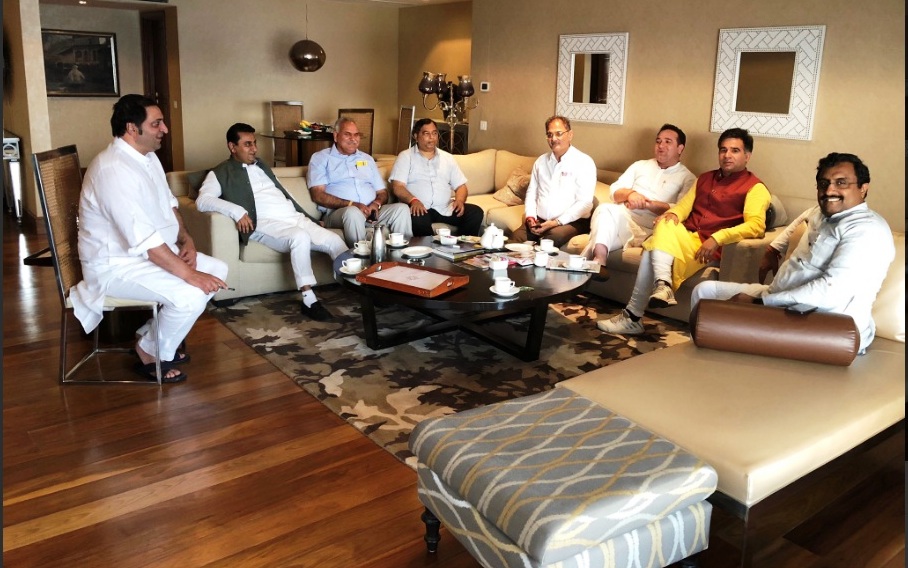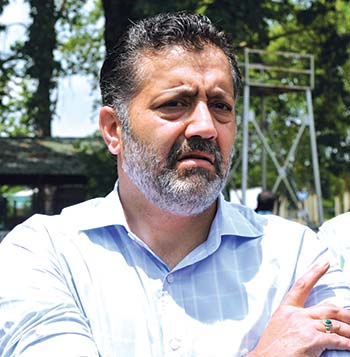By Khursheed Wani

“Someone asked him what he would count his biggest achievement in life,” Mehbooba Mufti told a group of journalists, before her government fell. “I thought his reply would be the re-opening of Srinagar-Muzaffarabad Road. Instead, he said his biggest achievement was to float a regional party that provided an alternative to the people.” Back then, still in the hot seat, she perhaps knew that under her leadership the party was fast losing its position.
The unceremonious sacking of Ms Mufti on June 19, was the anti-climax of a series of humiliations the People’s Democratic Party (PDP) was subjected to during its detested alliance with the BJP since March 1, 2015.
Within a fortnight of losing power, the edifice of two decades old party began shaking. Legislator after legislator came out openly to question Mehbooba’s leadership and held her responsible for the ‘worst state of affairs’. Imran Reza Ansari, first time legislator from Pattan, a constituency he inherited from his father, led the tirade. Imran’s uncle Abid Ansari, also a first-timer from Zadibal, joined the chorus. Two more first timers Muhammad Abbas Wani (Gulmarg) and Javed Hussain Beigh (Baramulla) followed suit in joining the league of dissenters.
It is unexplained as to why Mehbooba put in her papers instead of recommending the dissolution of assembly when she was formally informed by the Raj Bhawan that her government has lost the confidence. “This (not recommending dissolution) evidences that Mehbooba lacked political maturity and advice. She could not foresee that leaving the government in a particular situation could trigger upheaval within her party,” said a senior journalist. Eventually, Governor NN Vohra sought response from all political parties who could stake claim for the government formation. The negative responses from the political parties led him to recommend the Governor’s rule. Consequently, the assembly was sent into suspended animation.

Ansari and ilk’s revolt demonstrates that glue of power only held the flock together. No sooner did it go, the wannabes started turning around and hunting for options. It is difficult to predict whether the exhibition of dissent, observed for the first time in the party, would eventually lead to a split. After losing power in November 2005 partially and in July 2008 fully, the PDP leadership succeeded in keeping its flock together till it regained power. “This time around, PDP is an abject loser. It has lost the argument for the people and the elements of politics it thrived on during all these years,” observed a political analyst.
Ansari’s rebellion made headlines because the assembly is intact leaving a larger scope for horse-trading even in the presence of a stringent anti-defection law. The arrival of BJP’s Ram Madhav in Srinagar a few days after the fall of government was not for merrymaking. Madhav purposely tweeted a picture of a plush hotel suite in conversation with Peoples Conference chairman and first-time legislator from Handwara Sajjad Lone. Many BJP legislators including the party’s state president Ravidnder Raina filled the arc between Lone and Madhav. Informed sources said that Madhav did arrive to explore options for the government formation even if it materialized in several months but he did not return too optimistic after learning about the intricacies of unique anti-defection law. Nevertheless, he kept the ball rolling.
Ansari’s displeasure within the PDP was not unknown. Belonging to a Shia family with significant political and religious influence, he inherited the leadership from his father Molvi Iftikhar Ansari, who was one of the top PDP leaders. Imran had a grudge that he was not given an influential portfolio like Rural Development or Education that deprived him from reaching out to his cadre and constituency. He was pleading that the Shia vote bank translated into reality and gave the party two legislators at a time when the party’s pocket borough of south Kashmir witnessed several upsets. At one point in time, he gave to understand that he submitted resignation from the council of ministers, which was not accepted by Mehbooba.

Similarly, Javed Beg was eyeing on ministry owing to the influence of his uncle and MP Muzaffar Hussain, who himself remained disgruntled. Senior Beg was expecting a berth in union cabinet and wanted his party boss to negotiate it with the union government. Mehbooba did not allow him to outsize her. However, after the sacking of Haseeb Drabu from the council of ministers following his “controversial” statement in a Delhi conference attended by a battery of diplomats, Muzaffar Beg again got proximity with Mehbooba. His wife was soon nominated to lead the women’s wing of the party. Drabu was Beg’s ‘intellectual competitor’ in the party. Interestingly, the first-time legislator from Rajpora, Drabu went into oblivion after his humiliating sacking and shifted his base to Mumbai. After the fall of government, his proximity with Ram Madhav (with whom he co-authored Agenda of Alliance) refreshed and his actions started being monitored. Triggering speculations over his ‘chance’ meeting with Sajjad Lone in a Delhi restaurant was not altogether misplaced.
For the formation of any government, the basic requirement is to reach the magic number of 44 to stake a claim. It is not easy to engineer a major split in any of the parties to get the numbers without facing hurdles from the anti-defection legislation. The manoeuvring is more rhetorical than being practicable. For the time being, the street talk on the possibilities of formation of a new government has apparently changed the narrative. The explosive situation on Kashmir’s security front, especially in the southern region, is not being discussed in TV studios.
The BJP would ideally like to spring a surprise in Kashmir to cater to the Hindu nationalist sentiment in mainland India in run up to 2019 general elections. The sacking of Mehbooba was the trailer of the larger plot. In Kashmir, the BJP’s predicament is that it has not been able to attract a single credible face. This is despite the fact that the party remained in power for more than three years and still believes that Governor’s dispensation is its proxy.

Imran Ansari has thrown hints that he may join a party that does not believe in dynasty rule. Sources said that BJP’s prominent Muslim face Mukhtar Abbas Naqvi has got in touch with him to explore the possibilities. If Ansari takes a plunge, it would be a significant development in Kashmir politics. The BJP may get a face but Ansari has the risk of losing his face in the bargain. The choice is difficult. The way BJP pedalled the falsehood of the lack of development in Ladakh and Jammu as a reason for pulling out of alliance, has only reconfirmed the party’s inherent bias against Kashmir and its people.
The National Conference and Congress have enough numbers to be part of any alliance to keep the BJP out of power. Both the parties have shown unwillingness to get into power politics. During the all-party meeting at Raj Bhawan, the NC was the lone group that demanded dissolution of the assembly and fresh elections at appropriate time. Omar Abdullah is wisely playing his cards. The Congress is not categorical on dissolution of the assembly keeping the option of formation of new government open. However, the party chose to remain in limelight by holding a top-level meeting in Srinagar attended by Ghulam Nabi Azad, Ambika Soni and Saifuddin Soz.
Observers say that PDP did enough experimenting in entering into a coalition with the BJP. The coalition failed miserably and gave nothing except abject humiliation to Kashmir.
“Mufti Muhammad Sayeed may get benefit of doubt for entering into alliance with BJP because it was his first experiment. His daughter committed the blunder of entering again into alliance when she had chance to call it off. Now, after her humiliating ouster, if anyone else would attempt to commit the same blunder, it would be fraught with consequences,” said prominent journalist Altaf Hussain.














